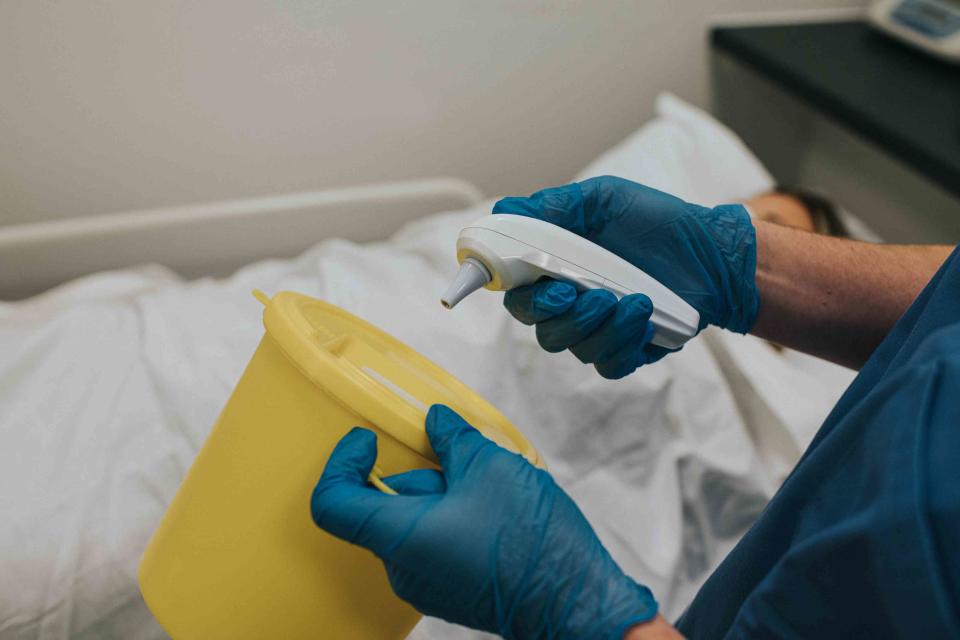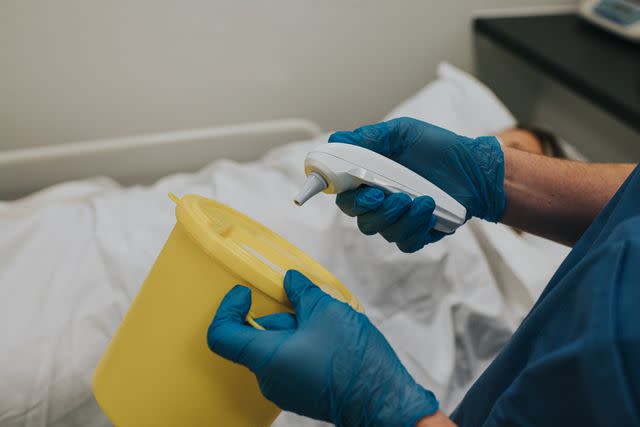Symptoms of Ebola - Yahoo Life

Catherine Falls Commercial / Getty Images
Symptoms of Ebola virus disease (EVD) start presenting anywhere from two to 21 days after exposure to the Ebola virus. Signs include the typical symptoms of a viral illness, such as fever, aches and pains, gastrointestinal issues, sore throat, and fatigue. Unexplained bleeding and bruising, red eyes, skin rash, and hiccups can also occur in the later stage of the illness.
Ebola virus disease is a rare but serious and often fatal illness initially transmitted to humans from wild animals and then spread through person-to-person contact. Ebola cannot be spread before symptoms start.
In this article, you'll learn more about the frequent symptoms and what to expect with EVD. You'll also get to know which rare symptoms to watch for, what Ebola complications exist, and when to see a healthcare provider for EVD symptoms.

Catherine Falls Commercial / Getty Images
Related:What Is a Viral Infection?
Common Symptoms
Ebola is rare, but the symptoms associated with it are not. EVD starts off the same as other viral infections with symptoms like fever, pain, and sore throat coming on quite suddenly. However, as the infection progresses, so do the symptoms.
While general symptom onset can occur between two and 21 days after exposure to the virus, sudden fever onset usually appears within eight to 10 days after exposure.
The first signs and symptoms of Ebola include:
Related:Reasons You Could Have No Appetite and Feel Sick
After four or five days of symptoms, the gastrointestinal tract is affected, with symptoms now including:
Abdominal pain
Vomiting
Diarrhea
Nonspecific (general) symptoms progress to include these more specific signs of Ebola:
At this point in the illness, lab testing through blood samples can detect signs of infection such as low white blood cell and platelet count and elevated liver enzymes.
Symptoms of Ebola are difficult to differentiate from symptoms of other viral and bacterial infectious diseases. For example, symptoms of Ebola overlap with the symptoms of:
The list of frequent symptoms across these infections are similar. For this reason, additional testing is necessary to determine if ebola or some other infection or health condition is causing the symptoms.
Complications
Ebola health complications can occur after recovering from Ebola. This is because the virus is said to persist after treatment and can still be found in some bodily fluids, including semen, pregnancy-related bodily fluids, and breast milk, and in some parts and systems of the body, including testicles, the central nervous system, and the inner eye.
If a person is pregnant or breastfeeding while they become infected with ebola and start showing signs and symptoms, this increases risk of complications. Data from the 2014–2016 EVD outbreak in West Africa suggest pregnancy status puts someone at increased risk of severe illness and even death, with mortality (death) rates ranging from 74% to 100%. From the pregnancy-specific data, researchers determined a total average maternal mortality rate of 86%.
Other complications associated with Ebola include mental health challenges associated with surviving a rare, contagious, and life-threatening illness, and relapse-symptomatic illness, which is rare but has been documented. Relapse-symptomatic illness is a return of symptoms in a previously treated or asymptomatic viral infection. Experts know relapse-symptomatic illness occurs because the virus starts replicating again but aren't exactly sure as to the underlying reason why.
Read Next:Getting COVID May Increase Your Risk of Developing Mental Health Issues
When to See a Healthcare Provider
In most cases, the symptoms of Ebola will not actually be symptoms of Ebola. It's much more likely the symptoms will be linked to a more common condition. Nevertheless, when you have a fever that won't break, or if you're unsure how to treat symptoms of influenza at home, you should consult with your healthcare provider. Also contact your provider if you have signs of viral infection.
If you experience symptoms of Ebola and have recently traveled to a destination with an ongoing public outbreak of cases of Ebola or other viral infection, such as malaria or typhoid fever, for whatever reason, call your healthcare provider immediately to let them know you're showing signs of infection and have recently traveled to a country with an ongoing outbreak.
While Ebola is a serious and often fatal disease, it is extremely rare outside of certain geographic regions like areas within the continent of Africa. Check with national authorities on protocol if you're traveling to a country affected by an Ebola outbreak.
Prognosis
Ebola can be fatal in cases where access to prevention and treatment is limited. The average Ebola case fatality rate is 50%, with rates varying significantly depending on community resources and community engagement. The range in fatality rate is as wide as 25% to 90% in past outbreaks.
Summary
Ebola is a rare but oftentimes fatal viral infection. Symptoms range from fever, fatigue, and sore throat to unexplained bleeding and liver and kidney impairment. Common symptoms overlap with symptoms of influenza, malaria, typhoid fever, pneumonia, and meningitis.
Any symptoms you experience that resemble Ebola should be taken seriously, especially if you have recently traveled to a destination with an ongoing outbreak. Complications during pregnancy and breastfeeding can occur. Prognosis depends on access to prevention and treatment options.
Comments
Post a Comment